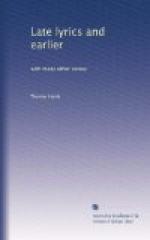A mad star crossed the sky to the sea,
Wasting in sparks as it streamed,
And when I looked to where stood she
She had changed, much changed, it
seemed:
The sparks of the star in her pupils gleamed,
She was vague as a vapour now,
And ere of its meaning I had dreamed
She’d vanished—I
knew not how.
I stood on, long; each cliff-top bough,
Like a cynic nodding there,
Moved up and down, though no man’s brow
But mine met the wayward air.
Still stood I, wholly unaware
Of what had come to pass,
Or had brought the secret of my new Fair
To my old Love, alas!
I went down then by crag and grass
To the boat wherein I had come.
Said the man with the oars: “This news
of the lass
Of Edgcumbe, is sharp for some!
“Yes: found this daybreak, stiff and numb
On the shore here, whither she’d
sped
To meet her lover last night in the glum,
And he came not, ’tis said.
“And she leapt down, heart-hit. Pity she’s
dead:
So much for the faithful-bent!”
. . .
I looked, and again a star overhead
Shot through the firmament.
SHE WHO SAW NOT
“Did you see something within the house
That made me call you before the red sunsetting?
Something that all this common scene endows
With a richened impress there can be no forgetting?”
“—I have found nothing to see therein, O Sage, that should have made you urge me to enter, Nothing to fire the soul, or the sense to win: I rate you as a rare misrepresenter!”
“—Go anew, Lady,—in by the right . . . Well: why does your face not shine like the face of Moses?” “—I found no moving thing there save the light And shadow flung on the wall by the outside roses.”
“—Go yet once more, pray. Look on a seat.” “—I go . . . O Sage, it’s only a man that sits there With eyes on the sun. Mute,—average head to feet.” “—No more?”—“No more. Just one the place befits there,
“As the rays reach in through the open door,
And he looks at his hand, and the sun glows through
his fingers,
While he’s thinking thoughts whose tenour is
no more
To me than the swaying rose-tree shade that lingers.”
No more. And years drew on and on
Till no sun came, dank fogs the house enfolding;
And she saw inside, when the form in the flesh had
gone,
As a vision what she had missed when the real beholding.
THE OLD WORKMAN
“Why are you so bent down before your time,
Old mason? Many have not left their prime
So far behind at your age, and can still
Stand full upright at will.”
He pointed to the mansion-front hard by,
And to the stones of the quoin against the sky;
“Those upper blocks,” he said, “that
there you see,
It was that ruined me.”




